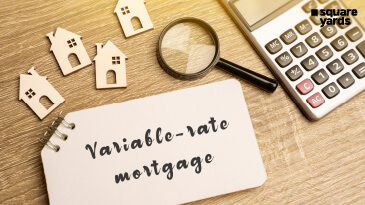Homeowners might need to switch their foresight on, set their planning brains to work and start preparing for heavy outflows of money. As 60% of Canadian mortgages steer towards renewal, the Royal Bank of Canada ( RBC ) has predicted a mortgage payment shock in the coming three years. This shock will result in an increase in monthly mortgage payments by 50% for homeowners. This means you’re budgets are going to get disrupted and you’re going to end up paying much, much more. The looming threat of payment shock had been flagged in an RBC report titled, “Canadian Banks: A Review of Mortgage Payment Shock”.
The report remarks that the renewal of more than $900 billion of mortgage by 2026, in the backdrop of rising borrowing costs, will inevitably hurt the banks’ treasuries and the homeowners’ pockets. Statistical expressions aside, a rough 50% increase in monthly payments is an alarming concern. While you cannot possibly control this rise, you certainly can plan for it. Today, we tell you the best ways to absorb this impending financial pressure as we discuss the ins and outs of mortgage payment shock.
What Is Mortgage Payment Shock?
Say you borrow a fixed-rate mortgage for your new home. Now, when the time has come for your loan’s renewal, the interest rates in the market have gone up. This means, that upon renewal with new terms and interest rates, you’re monthly payments towards repaying the loan will also increase. The fixed amount you’ve been up till now, month after month, will now change. This fresh financial burden that has fallen upon you is called a payment shock. In simple terms, mortgage payment shock is the financial strain resulting from a sudden and unexpected increase in one’s monthly financial obligations. Here are the top reasons responsible for it:
- Adjustable Rate Mortgages (ARMs): ARMs charge a fixed interest for a fixed initial period, after which they are re-adjusted as per the market conditions. This readjustment often leads to payment shock.
- Interest-Only Loans: While shifting from interest-only payments in the initial period to full amortisation later on, these loans can catch the borrowers off-guard with an immediate rise in mortgage payments.
- Escrow Payments: These include insurance premiums and property taxes. Any increase in these would also increase your overall mortgage payments.
- Changes in Loan Terms: Any changes such as rising interest rates, end of the fixed-rate period, transitioning from renting to owning etc. can result in payment shock.
- Economic Conditions: Inflation, housing supply and other economic factors heavily influence mortgage rates, eventually resulting in payment shock.
What’s Driving the Current Steer Towards Payment Shock?
Canada’s recent heading towards the impending shock can be attributed to many reasons. With ongoing inflation and a disparity in housing demand and supply, the Canadian housing market is already on the back foot. As per reports, homeowners today face some of the fastest and largest increases in interest rates in the past several decades. In such a backdrop, a lot of home renewals are scheduled to happen at the same time. All of this, combined with rising housing costs, is building up to the shock. There are also some interesting borrowing trends. Several studies have cited that more than half of Canadians have been opting for three-year fixed-term mortgages due to their initial attractive but low-rate offerings. While they may seem cheaper initially, they are generally renewed at a rate of 6-8%.
Shock Absorbers: 5 Tips to Handle the Upcoming Pressure
Now that the tangled threads of payment shock have been unknotted, it’s time to explore the best responses for what’s to come. Remember, mortgage payment shock cannot be averted, but only managed. Take a look at the best plans of action below:
-
Contact Your Bank
You are not alone in this. Banks are going to be affected by the shock as much as the mortgage owners. So, use that situation to your advantage. It is the right time to increase your existing monthly payments, switch to a fixed-rate mortgage or perhaps, repay the entire amount already. Since the banks are pressured too, open communication is more likely to lead to a positive bargain benefitting both parties.
-
Get Better At Budgeting
A foresighted and well-planned budget will be your best friend. As you know monthly payments are going to rise, look for areas where you can cut down. Further, no budgeting is successful until it’s backed by complementary actions. It’s equally important to stick to your budget as it is to plan it well.
-
Keep An Emergency Fund Ready
We all know how easy it is to deviate from our planned ways of spending. Therefore, it is important to have a backup fund ready in place. Do not wait for your mortgage renewal. Instead, look for places where you can save starting today, and start bulking up your emergency fund.
-
Get A Hang of Mortgage Terms
As you prepare yourself, try understanding the various nit-bits of your mortgage. You don’t need to become an expert, but being familiar with the various terms can help. Knowing your own specific loan inside-out will help gauge the full implications of payment shock for your particular situation.
-
Speak to A Financial Advisor
A financial advisor can help with all of the above-discussed ways. They can guide in managing increased payments, help make effective budgets and assist in making informed decisions. They also ensure that your home ownership and financial goals align with each other in the long run. Since you’ll be sharing your personal financial details, be sure to choose an advisor whom you can trust and rely on.
The New Canadian Mortgage Charter
“I really recognize that with interest rates having gone up very quickly, there are many, many Canadians who are concerned about their mortgages going up…”, remarked Canada’s Minister of Finance, Chrystia Freeland. “What we’re saying today is we understand this is a challenging situation and we are here to help.” With this, the Federal government laid out the Canadian Mortgage Charter in its 2023 Fall Economic Statement. The charter is essentially a set of guidelines for banks to follow when mortgage owners are renegotiating their mortgage terms.
Here are the 6 guidelines directed to the financial institution by the charter:
-
- Banks should reach out to homeowners 4 to 6 months before their mortgage renewal is due to help them plan better
- Temporary amortization period extensions to offer greater flexibility to mortgage holders
- Allowing borrowers to repay using lump sum options or by selling their principal residents without any prepayment penalty
- Insured borrowers need not qualify for the ‘stress test’ while switching lenders at the time of loan renewal
- Relieve interest on interest during any period of negative amortization
- Waive fees and costs which would’ve been charged for mortgage relief measures.
The Way Ahead
However daunting the present situation might seem, there is a very big positive to our advantage. It’s the way we prioritise our mortgages. Canadians are very particular about making their mortgage payments on time, and more than anything else, this is what’s going to keep them afloat. The mental attitude to rank mortgage payments above all other debt payments is going to be the lifeline that helps get on top of the mortgage payment shock. Payment shocks aren’t really for us to control. They are driven by much larger, macro-economic factors. With the government’s latest intervention and the practical tips we discussed, managing the forthcoming financial strain might be challenging, but not impossible!
Frequently Asked Questions (FAQs)
What’s meant by payment shock in mortgage?
Mortgage payment shock means a sharp increase in your monthly mortgage payments, resulting from spiking rates, changing mortgage terms and other factors.
What happens once you fully pay off your mortgage in Canada?
Once you’ve paid your mortgage in full, the bank releases the property from its claim and you gain full ownership. The bank will give you a mortgage discharge statement and the property title will be updated in your name without any encumbrances.
How many mortgage renewals are scheduled in Canada?
It is believed that roughly 60% of mortgages will undergo renewal by 2026. This translates to approximately $900 billion-plus of mortgages over the next three years. Hence, the resultant payment shock concerns a lot of the current homeowners.
What assistance is the government offering to help mortgage owners ease their financial strain?
Citing the ongoing trends in housing affordability, the Canadian government has come up with the New Mortgage Charter. The charter builds on existing mortgage guidelines to offer much more flexibility and respite to vulnerable borrowers facing peaking mortgage rates.











